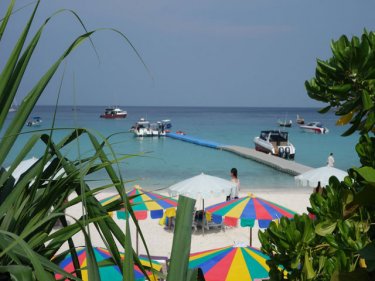PHUKET: How many governments does it take to halt the environmental degradation that will eventually destroy Phuket's tourism industry?
We don't know . . . we are still counting.
Yesterday's umpteenth official tour of Racha island, a onetime day-trip ''paradise'' just a short speedboat ride from Phuket, demonstrated once again what the problems are.
In no special order, those problems are: lack of will, greed, lack of enforcement, selfishness, lack of vision, and a tendency to compromise.
The only absolute rule when it comes to ''protecting'' the natural environment on Phuket appears to be ''whatever you do, pretend everything is all right.''
And so outright lies, self-deception and lack of transparency are piled on greed, lack of will, lack of enforcement etc.
This is a part of the world where the dive industry will hold an underwater cleanup once or twice a year, pat itself on the back, and pretend that Phuket's coral reefs and beaches are in perfect shape.
What yesterday's tour of Racha exposed was that this self-deception extends to other segements in tourism, particularly among resort managements.
For instance, Racha resident and environmental activist Sarid Jandi said that dive companies dependent on the Korean and Chinese markets were moving from Phi Phi to Racha - because the coral reefs at Phi Phi had already been ruined.
Of particular note are the diving businesses that allow tourists to ''dive'' wearing helmets, without lessons, and that expose the corals to the risk of greatest damage.
The five-star Racha Resort, which has previously insisted that it does the ''right thing'' environmentally, admitted yesterday that its water treatment plant needs upgrading.
Every time the plant overflows, it mixes with untreated fecal material from the Raya Father restaurant and washes pure piss and shit down the local canal to the sea.
Others do even less to protect the environment. The Baan Raya ''system'' catches the fat from kitchen waste but lets the rest flow to the sea.
The main Racha drinking water supply now comes from an open dam, which catches rainwater. Wells are now considered too risky in most places because of the toxicity from years of burying unsorted garbage.
Worst environmental breaches are at the Rayaburi, where the resort's restaurant now extends onto a once-public beach, where a canal has been reduced to a trickle, and where there is no access to the privatised Siam beach.
Racha history says the beach was named Siam beach after Rama VI fended off an ''invasion'' from Malaysians. Now the once-public space has simply been taken from Thailand for private use.
It's the success of Racha that's the problem. About 1200 people are now estimated to deposit waste on the island each day, either as day-trippers, residents or as tourism industry staff.
Garbage generated by the island's success as a tourism magnet will kill it in the end. Yet those profiting from Racha's popularity seem content to leave the problems to others to fix.
Those who should have enforced the law to protect the island's environment for their children and for other Thais have, down the years, done little, or nothing.
What's wrong with Racha is what's wrong with Phuket. The wrong people run the reefs and the beaches, the people whose only interest is financial gain, not environmental protection.
The willingness of Thailand's governments to allow the privatisation of Phuket's beaches and reefs is a slow-working but sure death sentence for tourism's most important natural attributes.
When Racha poisons itself with pollution, garbage and disinterest, Phuket will know: its turn is coming next.










Fantastic analysis. Well done K. Chutima.
Posted by Duncan on February 8, 2013 09:44